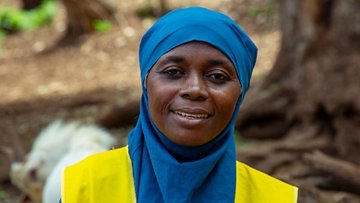Challenge
Comoros is highly vulnerable to climate change and increasing people’s economic resilience and reducing poverty are challenges. The socio-economic recovery grant program was initiated after Comoros was hit by Cyclone Kenneth in April 2019, which affected 345,000 people and 241 villages. The cyclone also affected people’s livelihoods and as a result, poverty was likely to deepen. The situation created by COVID-19 made vulnerable households even more fragile. This flagship program has provided a way to support the economic and social recovery of these households, especially those of women whose livelihoods and service facilities were damaged by the cyclone.
Approach
The Comoros Social Safety Net Project aimed to increase poor communities’ access to safety nets, nutrition, and community services. The project was originally designed to create a productive safety net program with nutrition activities but was extended to include socio-economic grants to ensure the recovery of vulnerable households affected by Cyclone Kenneth. To address household vulnerability, the project adopted a long-term vision, focusing more on resilience, the protection of human capital, women’s empowerment, and economic inclusion. This was planned to be achieved primarily through job creation, digitalization, and financial inclusion, all based on the principle of building back better.
Results
This project aligned directly with the country’s priorities of improving women’s economic inclusion, improving the living conditions of the poorest, building their resilience, enhancing economic opportunities, and increasing their access to basic services.
The project has been running since mid-2015. By April 2023, its main results included:
- Improved access to safety nets for 185,435 individuals through productive cash transfers, cash-for-work, and unconditional cash transfers.
- Enhanced livelihoods for 10,290 households through economic recovery grants, with a gender-sensitive approach (exceeding targets).
- Improved access to nutrition services for 33,340 individuals (pregnant women or children under five).
- Improved access to services for vulnerable households and populations in 189 poor communities in Comoros, through safety net services and the rehabilitation of community-based infrastructure.
- Over 10,000 project beneficiaries have initiated new economic activities, receiving cash transfers through banks, microfinance institutions or mobile money platforms that contribute to increasing digital access and financial inclusion.
The project has also contributed to enhancing key delivery systems and strengthening institutional capacity in the country. Progress has been made particularly in targeting instruments, including the development of new selection criteria and more transparent processes for management information systems and the monitoring and evaluation of safety net programs. The Ministry of Health, Solidarity, Social Protection, and Gender Promotion has developed a beneficiary registry that includes over 36,000 vulnerable households.
Bank Group Contribution
The project has benefitted from $30 million in IDA resources, $6 million from the initial project, and $24 million more from two additional financing operations.
Partners
The project is implemented by the Comoros Ministry of Health, Gender, Solidarity, and Social Protection, in collaboration with the Ministry of Production and the Ministry of Education.
Looking Ahead
Given the success of the program, the vision is to expand the socio-economic recovery grant in Comoros. Though COVID-19 highlighted the vulnerability of urban families, the expansion would include rural areas as well. The new Shock Responsive and Resilient Social Safety Net Project for Comoros has been built on this successful experience while strengthening the accompanying measures related to productive inclusion, early childhood development, and economic inclusion of women and youth.
